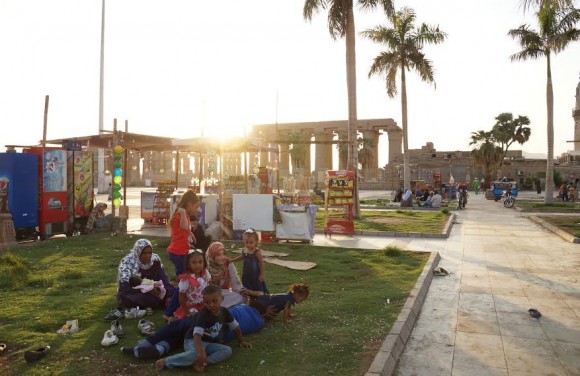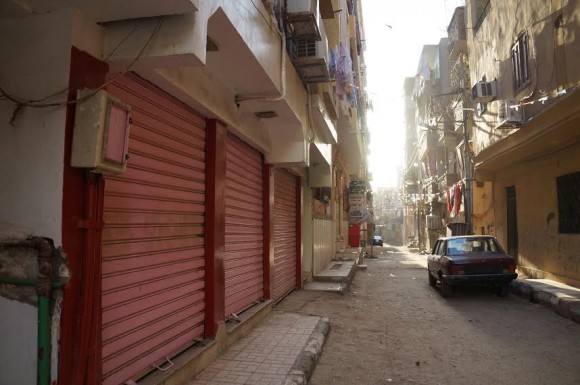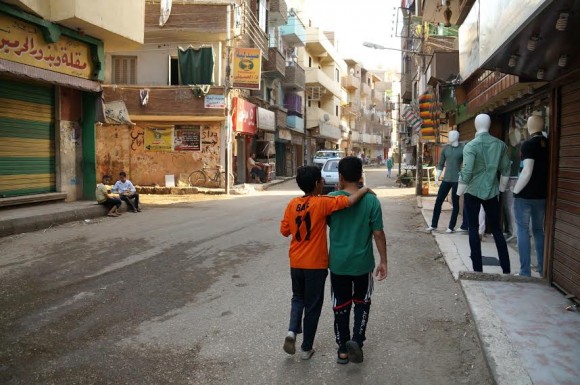
A family sits at a market square in front of Luxor Temple on Aug. 29, 2014 in Luxor, Egypt. (Photo Courtesy Alison Noon)
Alison Noon is a 2014 graduate of the University of Colorado and a former managing editor of CUIndependent.com. She now lives in Luxor, Egypt.
Whether a survival technique, a consequence of the educational system or simply apathy, the Egyptian people I’ve spoken with in the month I’ve spent in Luxor are uninterested in the myriad violent conflicts that surround them.
To the west, post-revolution Libya is nearing civil war, with the elected government facing a surge of Islamic fundamentalists. To the east, across the Red Sea, the Islamic State this summer amassed at least 10,000 troops and claimed eight towns and cities in Iraq and Syria in its effort to establish an (antiquated) Islamic caliphate. And at its most northeastern border, the Egyptian town of Rafah is still the only above-ground checkpoint to and from Gaza not controlled by Israel.
But it’s no topic of conversation in Luxor that the Egyptian army is suspected of secretly launching airstrikes against Libya’s opposition in Tripoli; that Egypt’s president and foreign minister are playing a major role in helping the United States accumulate allies to “destroy” ISIL; or that it was Egyptian negotiators who brokered the latest cease-fire agreement between Israel and Gaza.

A loudspeaker fastened to a building in Luxor sounds a morning call-to-prayer on Sept. 4, 2014, in Luxor, Egypt. (Photo Courtesy of Alison Noon)
Although I’m disappointed that political chatter is so uncommon, even with my closest companions here, I understand now that the Egyptian people are far too enamored of their own, day-to-day wellbeing to contemplate foreign threats. Trash-filled streets and the herds of jobless men who kick it around made Egyptian President Abdel Fattah al-Sisi seem out of touch when he spoke Saturday with U.S. Secretary of State John Kerry on the threats posed by Muslim fundamentalists. I’d be surprised if any Egyptian could watch the whole press conference that followed, given the nation’s daily electricity blackouts.
At the conference, Kerry lauded Egypt’s devotion to fighting terrorism and, specifically, degrading the Islamic State.
“As an intellectual and cultural capital of the Muslim world, Egypt has a critical role to play in publicly renouncing the ideology that ISIL disseminates,” Kerry said.
In Egypt, political safety trumps the economic limbo in which the majority of citizens are stuck. Sisi’s regime will fight Islamic fundamentalists whether or not they’re violent because a vague basis of Islamism — modern political Islam — is popular and therefore threatens a federal government that for international validity must maintain an air of secularism.
Each of the six presidents who have led Egypt sporadically since 1953 have embraced the nation’s Muslim backbone either personally or through various joint statements with Al-Azhar University, known otherwise as the world’s first university and today’s foremost Islamic educational center. But every president, at some point in his reign, has turned against the primary band of Islamic fundamentalists in Egypt. The Muslim Brotherhood, viewed increasingly poorly in the last decade, has been fighting for Islamism in Egypt since the latter years of its aristocracy. Since the 1960s, Brothers and political criminals have been jailed in concentration camps in Egypt’s western desert. After Sisi and the Egyptian army forced the previous president and Islamic idealist out of office last July, hundreds of Brothers have been sentenced to death, convictions upheld by Egyptian court.
Today, the Egyptian people are not torn between allowing or disallowing a party of Islamism; my experience has been that Egyptian Muslims simultaneously embrace religion and representative democracy. The problem that Egypt has with fundamentalist uprisings lies in the unfavorable repute of Islamism with world leaders — none of which are Muslim.
Egyptians are united in an inescapable state of poverty such that, even if they were concerned by the crises around them, any conversations on Libya, the Islamic State, Israel-Gaza or domestic fundamental regimes would turn to their own welfare as soon as the power cut out — taking with it many people’s water supplies in addition to air conditioning.
It seems to me that, more than regional stability or protecting Islamic beliefs, the people of Egypt desire an entire day without an electricity blackout.

